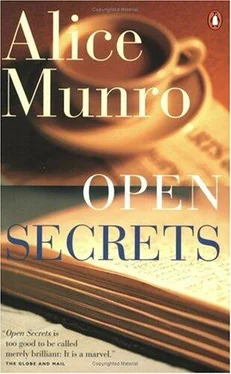Gail writes this on an old portable typewriter that she has bought from the secondhand shop down the street. By this time she is living at 491 Hawtre Street, in an apartment building called the Miramar. It is a two-story building covered with dingy cream stucco, with twisted pillars on either side of a grilled entryway. It has a perfunctory Moorish or Spanish or Californian air, like that of an old movie theatre. The manager told her that the flat was very modern.
“An elderly lady had it, but she had to go to the hospital. Then somebody came when she died and got her effects out, but it still has the basic furniture that goes with the flat. What part of the States are you from?”
Oklahoma, Gail said. Mrs. Massie, from Oklahoma.
The manager looks to be about seventy years old. He wears glasses that magnify his eyes, and he walks quickly, but rather unsteadily, tilting forward. He speaks of difficulties — the increase of the foreign element in the population, which makes it hard to find good repairmen, the carelessness of certain tenants, the malicious acts of passersby who continually litter the grass. Gail asks if he had put in a notice yet to the Post Office. He says he has been intending to, but the lady did not receive hardly any mail. Except one letter came. It was a strange thing that it came right the day after she died. He sent it back.
“I’ll do it,” Gail said. “I’ll tell the Post Office.”
“I’ll have to sign it, though. Get me one of those forms they have and I’ll sign it and you can give it in. I’d be obliged.”
The walls of the apartment are painted white — this must be what is modern about it. It has bamboo blinds, a tiny kitchen, a green sofa bed, a table, a dresser, and two chairs. On the wall one picture, which might have been a painting or a tinted photograph. A yellowish-green desert landscape, with rocks and bunches of sage and dim distant mountains. Gail is sure that she has seen this before.
She paid the rent in cash. She had to be busy for a while, buying sheets and towels and groceries, a few pots and dishes, the typewriter. She had to open a bank account, become a person living in the country, not a traveller. There are shops hardly a block away. A grocery store, a secondhand store, a drugstore, a tea shop. They are all humble establishments with strips of colored paper hanging in the doorways, wooden awnings over the sidewalk in front. Their offerings are limited. The tea shop has only two tables, the secondhand store contains scarcely more than the tumbled-out accumulation of one ordinary house. The cereal boxes in the grocery store, the bottles of cough syrup and packets of pills in the drugstore are set out singly on the shelves, as if they were of special value or significance.
But she has found what she needs. In the secondhand store she found some loose flowered cotton dresses, a straw bag for her groceries. Now she looks like the other women she sees on the street. Housewives, middle-aged, with bare but pale arms and legs, shopping in the early morning or late afternoon. She bought a floppy straw hat too, to shade her face as the women do. Dim, soft, freckly, blinking faces.
Night comes suddenly around six o’clock and she must find occupation for the evenings. There is no television in the apartment. But a little beyond the shops there is a lending library, run by an old woman out of the front room of her house. This woman wears a hairnet and gray lisle stockings in spite of the heat. (Where, nowadays, can you find gray lisle stockings?) She has an undernourished body and colorless, tight, unsmiling lips. She is the person Gail calls to mind when she writes the letter from Catherine Thornaby. She thinks of this library woman by that name whenever she sees her, which is almost every day, because you are only allowed one book at a time and Gail usually reads a book a night. She thinks, There is Catherine Thornaby, dead and moved into a new existence a few blocks away.
All the business about armigerous and non-armigerous Thornabys came out of a book. Not one of the books that Gail is reading now but one she read in her youth. The hero was the non-armigerous but deserving heir to a great property. She cannot remember the title. She lived with people then who were always reading Steppenwolf , or Dune , or something by Krishnamurti, and she read historical romances apologetically. She did not think Will would have read such a book or picked up this sort of information. And she is sure that he will have to reply, to tell Catherine off.
She waits, and reads the books from the lending library, which seem to come from an even earlier time than those romances she read twenty years ago. Some of them she took out of the public library in Winnipeg before she left home, and they seemed old-fashioned even then. The Girl of the Limberlost. The Blue Castle. Maria Chapdelaine . Such books remind her, naturally, of her life before Will. There was such a life and she could still salvage something from it, if she wanted to. She has a sister living in Winnipeg. She has an aunt there, in a nursing home, who still reads books in Russian. Gail’s grandparents came from Russia, her parents could still speak Russian, her real name is not Gail, but Galya. She cut herself off from her family — or they cut her off — when she left home at eighteen to wander about the country, as you did in those days. First with friends, then with a boyfriend, then with another boyfriend. She strung beads and tie-dyed scarves and sold them on the street.
Dear Ms. Thornaby ,
I must thank you for enlightening me as to the important distinction between the armigerous and the non-armigerous Thornabys. I gather that you have a strong suspicion that I may turn out to be one of the latter. I beg your pardon — I had no intention of treading on such sacred ground or of wearing the Thornaby coat of arms on my T-shirt. We do not take much account of such things in my country and I did not think you did so in Australia, but I see that I am mistaken. Perhaps you are too far on in years to have noticed the change in values. It is quite different with me, since I have been in the teaching profession and am constantly brought up, as well, against the energetic arguments of a young wife .
My innocent intention was simply to get in touch with somebody in this country outside the theatrical-academic circle that my wife and I seem to be absorbed in. I have a mother in Canada, whom I miss. In fact your letter reminded me of her a little. She would be capable of writing such a letter for a joke but I doubt whether you are joking. It sounds like a case of Exalted Ancestry to me .
When he is offended and disturbed in a certain way — a way that is hard to predict and hard for most people to recognize — Will becomes heavily sarcastic. Irony deserts him. He flails about, and the effect is to make people embarrassed not for themselves, as he intends, but for him. This happens seldom, and usually when it happens it means that he feels deeply unappreciated. It means that he has even stopped appreciating himself.
So that is what happened. Gail thinks so. Sandy and her young friends with their stormy confidence, their crude righteousness might be making him miserable. His wit not taken notice of, his enthusiasms out-of-date. No way of making himself felt amongst them. His pride in being attached to Sandy going gradually sour.
She thinks so. He is shaky and unhappy and casting about to know somebody else. He has thought of family ties, here in this country of non-stop blooming and impudent bird life and searing days and suddenly clamped-down nights.
Dear Mr. Thornaby ,
Did you really expect me, just because I have the same surname as you, to fling open my door and put out the “welcome mat”—as I think you say in America and that inevitably includes Canada? You may be looking for another mother here, but that hardly obliges me to be one. By the way you are quite wrong about my age — I am younger than you by several years, so do not picture me as an elderly spinster in a hairnet with gray lisle stockings. I know the world probably as well as you do. I travel a good deal, being a fashion buyer for a large store. So my ideas are not so out-of-date as you suppose .
Читать дальше












